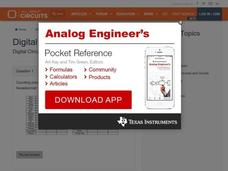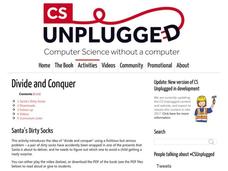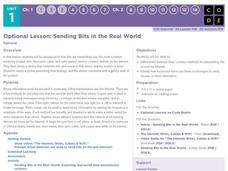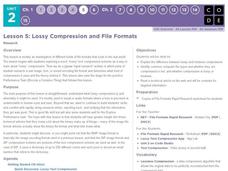Curated OER
Coding History
Students study the topic of codes in Computer Science. They research it history, divisions in the field and its applications. The instructional activity also includes a brief overview of the information technology theory.
Code.org
Encoding and Sending Formatted Text
Introduce your class to encoding text. Pairs work together to create a protocol to send text prior to learning ASCII encoding. Groups then collaborate to send and translate ASCII codes creating a formatted text message.
Curated OER
Binary and Communication Systems
Students participate in an activity that introduces them to the concept of binary coding as a language. They decode messages using special boards that has its own code for different letters. They create new codes by rearranging wires...
Curated OER
Digital Codes
In this electrical circuit worksheet, students answer a series of 12 open-ended questions about various types of digital codes. This worksheet is printable and the answers are revealed online.
TryEngineering
Data Representation: Millions of Colors
How many colors do you know? The lesson teaches scholars how digital devices use binary and hexadecimal representations to store colors. They learn how millions of colors are available on these devices.
NASA
Speaking in Phases
Hear from deep space. Pupils learn how satellites transfer information back to Earth. They learn about three different ways to modulate radio waves and how a satellite sends information with only 0s and 1s. Using sound, class members...
Curated OER
Zeros and Ones
Students review counting, the number system and the decimal number system. They rotate through three stations, "How RAM Works, "Binary Numbers" and "Binary Letters." They complete three separate worksheets to check for complete...
Code.org
Encoding B and W Images
Imagine drawing with zeros and ones. The third lesson in a unit of 15 introduces the class to creating black and white images. Pairs get together to create an encoding scheme in order to make these images. They move on to a using a...
Code.org
Processing Arrays
Scholars use a playing card activity to help them develop a program to find the minimum value of a list. They learn to use for loops to write code that will process lists.
Computer Science Unplugged
Divide and Conquer—Santa’s Dirty Socks
The story "Santa's Dirty Socks" provides learners an example of a search algorithm that uses a divide and conquer system similar to a binary search algorithm. The included questions expand upon the concepts that follow the story.
Curated OER
Math: Number Systems
Students examine other number systems, particularly the binary number system. They discover how to convert from decimal to other base systems. Students analyze the advantages and disadvantages of using the coded decimals.
Code.org
Encoding Numbers in the Real World
Ah, the numerous number of numbers. Individuals research different ways of encoding numbers. After conducting their initial research, they find classmates who have researched a different article and the pair share information. The lesson...
PBS
Passion for Pixels
Picture this: a fun activity for pupils to discover pixels. After learning about digital signals and pixels, scholars act as senders and receivers of an image. The sender indicates zero or one to tell whether each square in a grid is...
Code.org
Sending Bits in the Real World
A bit optional. How do computers transmit in the real world? Pupils research a device that is used in transmitting bits, then individuals create a poster that presents the information they have learned about their device.
Code.org
Number Systems
Generating a system of shapes. Groups work together to create a number system using three different shapes as symbols. The groups should come up with the rules that generate all the possible permutations of the three shapes.
Code.org
Practice PT - Encode an Experience
Encoding What I did Last Summer. Class members develop a way to encode a personal experience using a top-down approach to determine components and sub-components of their experience They then pick one portion of the experience and go...
College Board
AP® Computer Science: A Picture Lab Student Guide
How do you modify digital pictures? In this lab learners write methods that modify digital pictures. They how to traverse a two-dimensional array of integers or objects, and are introduced to nested loops, binary numbers, interfaces, and...
College Board
Strategies for Teaching AP Computer Science
Implement strategies from the beginning to the end. A collection of strategies and lessons span from the first day of school to after the exam. Resources cover basic information such as computer ethics and top 10 tips to a instructional...
Computer Science Unplugged
Card Flip Magic—Error Detection and Correction
I can find the error in an array of cards? After watching a demonstration class members search for the error is the provided cards. The resource provides a real-life example of using ISBN numbers in error detection and using check sums.
Curated OER
Binary Numbers
Middle schoolers explore how a battery-powered light box demonstrates how to transmi timages.
Code.org
Lossy Compression and File Formats
I'm compressed. Groups do a rapid research of different file types to determine what kind of compression the formats use and how it works. They share their information with the rest of the class until everyone has all the information for...
Computer Science Unplugged
Battleships—Searching Algorithms
How does a computer perform a search in order to find data? The lesson begins with a demonstration on finding one number out of 15. Pairs then play three games of Battleship by using different search techniques. The lesson plan finishes...
Curated OER
Review of Thermodynamics
In this thermodynamics activity, students complete 50 multiple choice questions on thermodynamics laws. They calculate energy in the system.
Curated OER
Pixel Transmission
Students develop code systems to transmit information between groups. They explore, explain and apply techniques used to transmit remote sensing data to better understand remote sensing images.

























